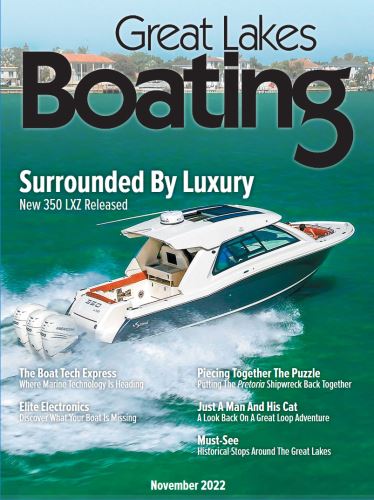Editorials May-June 2016
May 2016
Editorials
GLB Admin
Earmark Federal Fuel Tax Funds for Marina Restoration
An estimated 70 percent of the marinas dotting the Great Lakes are at least 30 years old, and this is a conservative estimate. On Michigan’s Lake Michigan shoreline, many marinas are nearing 50 years old without having made any significant changes to their infrastructures. Why not? The simple answer is that these changes are expensive and most marinas don’t have enough money.
But this is hardly a permanent condition. All it takes is for the federal government to approve spending money to change this, but Congress is not listening to recreational boaters and sportsfishermen. If Congress took the money collected from taxes imposed on boat fuel and marine accessories and spent it on these dilapidated infrastructures, Great Lakes marinas and boatyards could get the money they need to renovate, or even replace, their decaying facilities.
So why don’t state governments help their own marinas? State governments in the Great Lakes find themselves in precarious positions. They face massive deficits each year and claim they have more pressing issues to deal with. Moreover, most states mistakenly believe that recreational boating and sportsfishing are in good shape compared to other interests asking for money. Therefore, the federal government is the most viable source of funding.
The federal government has appropriated more than $1.5 billion over the last five years to the Great Lakes Restoration Initiative. Much of that money has been spent on keeping Asian carp from spreading into the Great Lakes, a problem that is no longer a significant threat. Unfortunately, the federal government has not dedicated sufficient funds for the restoration of marinas on the Great Lakes.
The federal government says that it is supporting recreational boating and fishing through the Sport Fishing Restoration Act. Unfortunately, this act does little for marinas, except to construct transient slips for marinas. Over the years, many of these moorings have been built, so there is little need to continue throwing that money at a problem that no longer exists. Instead, the federal government should earmark those funds for marina restoration.
Calls from the Great Lakes Boating Federation to members of Congress to change where the money is being spent have not led to any action. Even the local district of the U.S. Army Corps of Engineers believes spending more money on ailing marinas is a good idea, but they acknowledge that Congress has not provided the funding. The Great Lakes’ 4.3 million boaters, whose annual economic impact is nearly $9.5 billion, need someone who will listen to their concerns.
The lack of action by the federal government shouldn’t stop us from asking for help on behalf of our marinas. If we’re persistent, someone in Congress will listen to our calls and answer our request.
Seeking Solutions for Abandoned Boats
Everyone is familiar with the old adage that the two happiest days in a boater’s life are the day one buys a boat and the day one bids that vessel farewell.
Now that farewell can take many forms. Encumbered by maintenance and costs, some boaters decide to sell, leaving their boating days behind. Other boats might be passed down through several generations. Some fortunate boaters may seek upgrades, having outgrown their current watercrafts. Sadly, all boats reach an age at which they are no longer fit for the water.
For many centuries when the majority of vessels were constructed of wood, their disposal posed little environmental threat. However, as our feature story on Great Lakes marine debris points out, approximately 50 years ago fiberglass boats became an industry norm and have since dominated the boating market. Many of the original fiberglass boats are now reaching the end of their lifespans.
Unfortunately, there is no proper way to discard or recycle fiberglass boats. Fiberglass boats are often brought to landfills—an expensive endeavor that many boat owners seek to avoid.
Therefore, thousands of abandoned and derelict vessels (ADVs) litter waterways across the country and contribute to the urgent marine debris problem. Recycling ADVs has proven ineffective because scrapyards are reluctant to pick up old boats and they ultimately don’t know what to do with fiberglass. Many abandoned boats end up littering our waterways, marinas, roadsides, and backyards.
Because no viable option currently exists to properly dispose of fiberglass, boaters must be more proactive and environmentally discerning when purchasing boats.
While fiberglass boats are popular because they are lightweight and easy to maintain, boaters do have more responsible environmental options. Steel, wood, and aluminum alternatives exist and boaters who take seriously their environmental impact might consider these options. Steel, wood, and aluminum each are still available, but are not as pervasive or popular as fiberglass. But depending on boaters’ preferences, non-fiberglass hulls could be a prudent, affordable choice.
Another way to reduce the number of abandoned vessels is boat sharing or renting. Over the past several years, dozens of peer-to-peer boat sharing companies have emerged throughout the country and are gaining traction in the Great Lakes. These companies allow owners to rent their boats to other recreationalists who don’t have the time, patience, or resources to own a boat themselves.
These companies create a source of revenue for boat owners and increase the number of people who can enjoy the Great Lakes without taxing themselves or the environment. Boat sharing can limit the amount of fiberglass in the Great Lakes, reduce the number of ADVs, and ultimately preserve the environment.
None of these solutions is perfect. Until a comprehensive process for recycling fiberglass is developed, abandoned boats will threaten our waterways. All of us should be mindful of the impact discarded boats have on our environment and consider alternatives before importing more fiberglass into the Great Lakes.

